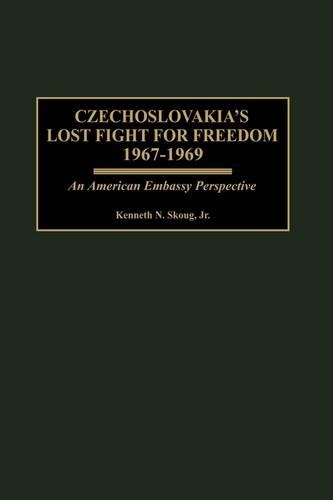
Czechoslovakia's Lost Fight for Freedom, 1967-1969: An American Embassy Perspective
(Hardback)
Publishing Details
Czechoslovakia's Lost Fight for Freedom, 1967-1969: An American Embassy Perspective
By (Author) Kenneth N. Skoug
Bloomsbury Publishing PLC
Praeger Publishers Inc
30th August 1999
United States
Classifications
Tertiary Education
Non Fiction
Political control and freedoms
International relations
943.7042
Physical Properties
Hardback
296
Description
This account, by a Czech-speaking American diplomat who lived in Czechoslovakia from 1967-1969, describes the collapse of a repressive Communist regime, the subsequent unprecedented explosion of popular freedom, the surprise Soviet occupation and the spirited passive resistance of the population until the gradual strangulation of the "Prague Spring". Drawing on his own journal, recent memoirs and documentary materials in the National Archives, the author shows how American diplomats and senior US officials analyzed and reacted to ongoing events. He explains how reform leader Alexander Dubcek became wedged between enthusiastic popular support and the objections of ultra-orthodox Soviet leaders. Skoug's economic and commercial responsibilities gave him considerable acess to Czechoslovak officials even in the Novotny period, and he was an eye witness to the invasion and many other crucial events of the period, including the great patriotic demonstration of March 1969 which the Soviet Union exploited to force Dubcek's resignation. Despite overt Soviet pressure, neither Prague nor Washington anticipated intervention. The Johnson Administration, courting Moscow for help on Vietnam, displayed calculated indifference to the dispute and reacted tepidly to developments. Left alone, the Czechoslovak population met the invader with militant, if passive, resistance, but the Dubcek leadership capitulated to Soviet demands and acquiesced in an occupation that gradually betrayed all of the gains achieved. Subsequent reluctance by Washington to criticize Moscow helped the Soviet Union cut its diplomatic losses. On the other hand, the Czechoslovak crisis may have helped to persuade Gorbachev to allow Eastern Europe to resolve its own affairs in 1989.
Author Bio
KENNETH N. SKOUG, JR. was a member of the Foreign Service of the United States from 1957-1990, retiring with the rank of Minister Counselor. He served in Germany, Mexico, Czechoslovakia, the Soviet Union, Venezuela (twice) and four times in the U.S. Department of State, Washington, D.C. He received Presidential and meritorious service awards in 1988 and 1991 and the Orden del Libertador from the President of Venezuela in 1990. His other publications include The United States and Cuba under Reagan and Shultz: A Foreign Service Officer Reports (Greenwood, 1996).
